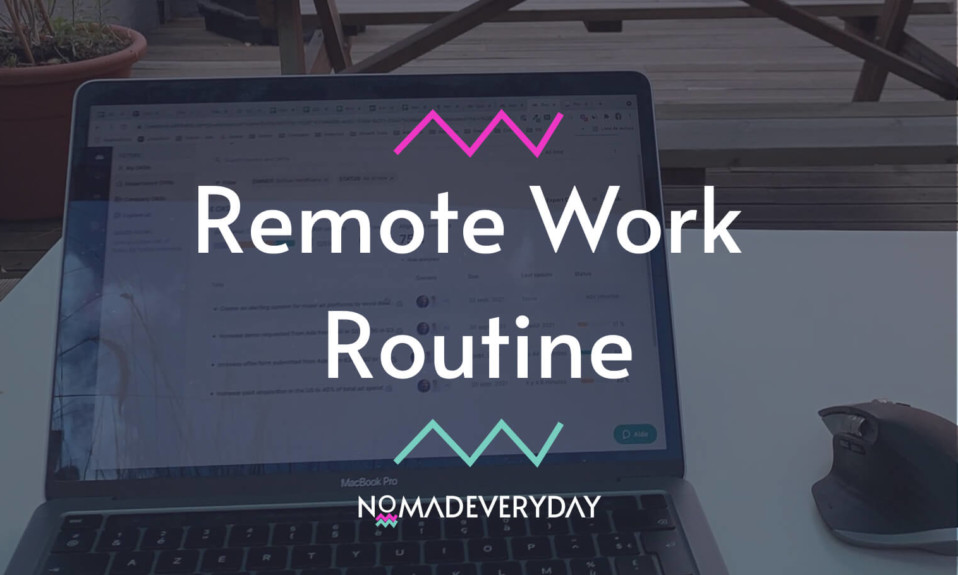In this post you will learn everything on how to create a healthy work from home routine.
Whether you are an early riser or not, it is important to create a routine for yourself. It should be realistic, meaning that you should be able to stick to it easily.
Self-employed or a full-time employee, set a general schedule for your day.
The Covid-19 pandemic has made working remotely widespread for more than 40% of employees in the United States, and more than 60% in the United Kingdom.
But let’s face it, it’s not always easy.
You may have trouble organizing a routine, your workspace, or getting used to the loneliness of working remotely.
Implementing this routine will require careful planning and organization. Here are a few tips for adopting good habits for working remotely.
8 healthy work from home routine to stay efficient
Wake up early
If you’re used to getting up at 7:30 a.m. to go to work, don’t change your good habits.
This may sound like obvious advice, but it’s also one of the most effective.
In fact, it’s important to keep your habits and adapt them when you’re working from home.
Getting up early allows you to organize your thoughts, take your time and find the motivation to face this new day.
A scientific study has shown that early risers are less likely to be depressed.
Get dress
The urge to get up last minute and stay in your pyjamas to work is tempting.
However, this behavior is more likely to have an impact on our productivity, because our state of mind is not really at work.
Getting dressed allows for a clear distinction between work and private life.
The importance of getting dressed while working from home is mainly due to the routine that will punctuate your day.
Setup your workspace
Give yourself the means to succeed. Create a workspace worthy of the person you are!
Your workspace must be :
- Find a space in your house where you can focus
- Adapted the space to your professional activity
- Keep it clean and organized
Creating a dedicated workspace at home will allow you to separate your professional and personal life and to really breathe at the end of the day.
It is therefore essential to go through this step to work better at home.
Create and prioritize your daily tasks
Having a list of exactly what you need to do each day will increase your productivity and ensure that you don’t forget key tasks or top priorities.
As a general rule, start with the most important tasks so that they get done faster.These are usually the tasks you want to put off the most.
Give yourself 15 minutes to get into it and you’ll see that after that time, it will flow by itself.
Experiment several productivity techniques to find the one you like best. You can, for example:
- Set 2-3 daily goals to achieve;
- Start with the most difficult/burdensome task;
- Work 25 minutes intensively for 5 minutes break;
- Schedule time off for the unexpected;
- Plan the next day’s schedule the same evening.
Also prepare your to-do list at the end of the day for the next day.
Then you’ll start the next day more concretely, with a plan already in place.
Plan uninterrupted work times
The cat playing. The sun on the terrace. The distractions are many and varied.
Not to mention Slack or social media notifications.
It’s hard to focus at home. Setting up your workspace will help, but here are the things that you can do:
- Put your phone on silent if possible
- Consider using background music to help you focus
Fortunately, new technologies are also here to bring us solutions. So, some mobile applications are great to increase our motivation rate.
Take breaks. Talk to someone.
It is important to take breaks when working from home if you want to keep your productivity up, not lose your attention and stimulate your creativity.
Some people prefer to take a 20 to 30 minute break every 2 hours. Like on the highway. Or micro breaks of 5 to 10 minutes once an hour.
You can set an alert, or simply take a break as soon as you feel you are losing focus.
Stretch your legs, have a cup of tea or coffee, get some fresh air, take a power nap or listen to your favorite podcast – anything that helps you disconnect from work.
You’ll come back to your job refreshed and ready to continue.
If working from home makes you feel a little isolated, check in with others. This is especially important if you live alone or are self-employed.
Exercise when you have time
Sitting all day increases the risk of heart disease by 63%.
Invest the time saved in public transport and to start exercising.
Here are some ideas:
- Stretching as soon as possible;
- Pay attention to your posture;
- Walk or climb the stairs every 30 minutes;
- Run or do yoga once or twice a week;
- Drink tea, water, herbal teas to stay hydrated;
If you don’t have time to go running, take a fitness lesson or an online yoga class!
A little zen ritual will help you relax so you can focus better back at your desk.
Don’t overwork
When you work from home, you are tempted to work more hours than when you work in an office.
In fact, we have more time at our disposal. Don’t disrupt the “work-life” balance.
The value of your work is measured by your results, not by the number of hours you put in for your employer.
Not by the number of tasks you handle. Not by the number of emails you send each day. By your results and only by your results.
Use the time to do something you enjoy (not to work more). Here are the things you should do:
- Don’t turn your computer back on after work hours.
- Turn off your computer at a specific time each day.
- Pause your app notifications and ignore emails outside of your work hours.
Working from home is a certain art of living composed of small habits and good resolutions.
Of course, you have to listen to your body and your mind but you also have to set professional goals and stick to them.
Finally, here is a summary of new life habits to put in place little by little:
- get up early (8am maximum);
- get dress
- create a real work space at home;
- plan intense work times ;
- use applications to help you ;
- move to stay in shape;
- don’t overwork










